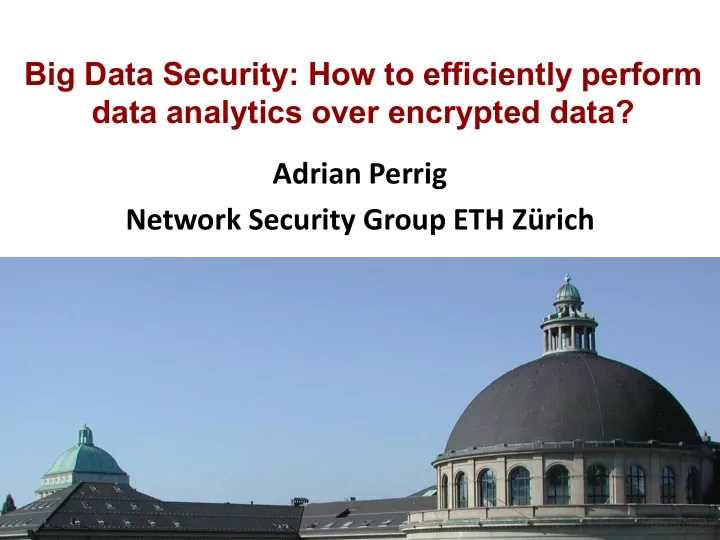

Big Data Security: How to efficiently perform data analytics over encrypted data? Adrian Perrig Network Security Group ETH Zürich 1
Why worry about Big Data Security? Security is well understood and well handled! Really? 2
Problem Setting Corporations perform transactions in the cloud and store user content in the cloud Core security challenges Cloud Providers • Malicious user • Malicious corporation • Malicious cloud provider • Malicious administrator 3 Users Corporations
Missing Link: Secure Computation Existing security techniques are incomplete Good data-in-motion protections • VPNs, SSL, IPsec Good data-at-rest protections • Full disk encryption • Self-encrypting disk drives Eventually the data must be used! • Cannot assume the absence of malware • Malware may be in peripherals (disk, keyboard, GPU) • Malicious insider / administrator has full access
Observation Need complete set of data protections, including • Isolated execution Secure loading Secure execution data in-situ Secure state storage, preventing replay attacks • Secure backup • Verifiable deletion data at rest data in transit
Approaches Trust: rely on cloud provider for security • Pro: Efficient • Con: Misaligned incentives, lack of liability in case of attacks Cryptography: secure multi-party computation • Pro: no need to trust execution • Con: inefficient, 10000-1000000x slower Trusted hardware • Pro: efficient and relatively easy to use • Con: trust in manufacturer, increased HW cost 6
Trusted Platform Module (TPM) Overview Trusted Computing Group (TCG) proposed Trusted Platform Module (TPM) chip • Already included in many platforms (over 600 million devices deployed by Spring 2011) • Cost per chip around $1 Modern microprocessors provide special instructions that interact with TPM chip • AMD SVM: SKINIT instruction • Intel TXT/LT: GETSEC[SENTER] instruction
Creation of Isolated Execution Environment AMD / Intel late launch extensions Secure Loader Block (SLB) to execute in IEE SKINIT / SENTER execute atomically • Sets CPU state similar to INIT (soft reset) • Resets dynamic PCRs • Enables DMA protection for entire SLB • Sends SLB contents to TPM • Begins executing at SLB’s entry point SKINIT SLB SENTER
How to Remotely Verify/Attest? V S Nonce N Nonce N S S N N S Means H(S) and N are signed by platform key N
Systems Built with these Primitives Jonathan M. McCune, Bryan Parno, Adrian Perrig, Michael K. Reiter, and Hiroshi Isozaki, "Flicker: An Execution Infrastructure for TCB Minimization". ACM European Conference on Computer Systems (EuroSys), March 2008. Jonathan McCune, Yanlin Li, Ning Qu, Zongwei Zhou, Anupam Datta, Virgil Gligor, and Adrian Perrig, "TrustVisor: Efficient TCB Reduction and Attestation". IEEE Symposium on Security and Privacy, May 2010. 10
Flicker Goals • Isolated execution of security-sensitive code S • Attested execution of Output = S( Input ) • Minimal TCB Untrusted App App Trusted OS S V Verified Shim HW
TrustVisor Goals • Similar to Flicker, trade off TCB size with high efficiency • Isolated execution of security-sensitive code S • Attested execution of Output = S( Input ) App App S OS V TrustVisor HW
User-Verifiable Trusted Environment Setup App App OS S Legend: HW Untrusted Trusted Verified
Trusted Channels btw Protected Partitions App App App App S S OS OS TrustVisor TrustVisor HW HW
Strong Isolation for Data Secrecy/Integrity App App S OS TrustVisor HW
Summary Secure HW enables powerful properties in the cloud • Verification of hardware platform • Attestation of software executing in cloud • Isolation of secure execution environment • Protection against malicious administrator • Protection against malicious peripherals, OS, VMM Low performance overhead Readily applicable to current applications, minor modifications required Flicker and TrustVisor are free and open-source 16
Recommend
More recommend